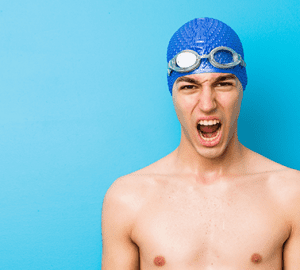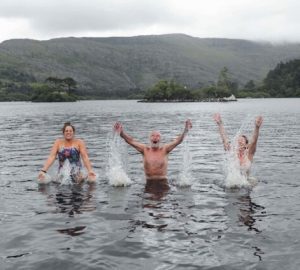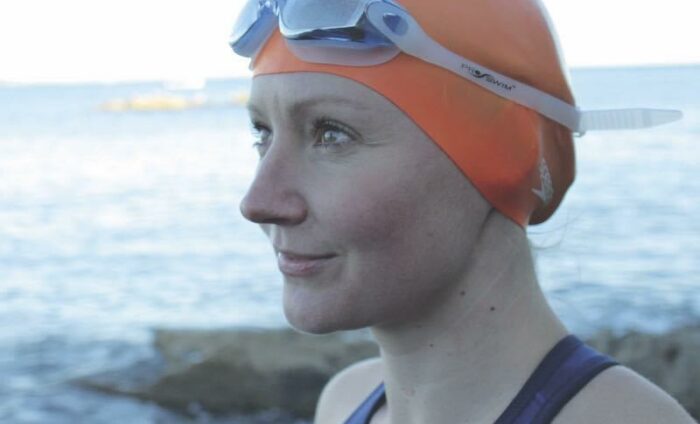
Tonic of the Sea
Wild sea swimming and being outdoors in the natural world helped Katie Maggs recover from a breakdown caused by burnout
Two years ago health studies lecturer Katie Maggs suffered a mental breakdown caused by burnout. The stresses of everyday life became too much and she spiralled into depression, anxiety, panic and sleep loss. Her brain and body crashed through severe exhaustion and she found herself adrift in one of the loneliest times of her life, losing her sense of self and her confidence. Lying awake at night, unable to sleep and emotionally drained, she would find herself out in the early morning taking photos, sitting at Battery Rocks near her home in Penzance, Cornwall, waiting for the sun to rise. It was here that she met the Battery Rocks wild swimmers.
Katie now swims every day in the sea off Battery Rocks and believes that sea swimming and being in the natural world played a huge role in the recovery from her breakdown. “Being in the sea reminds you that we are part of the natural earth and if we don’t spend enough time doing that our poor bodies and minds get overloaded and can’t cope,” she says. “It has brought me back to complete health. I feel completely well again, completely me again. Swimming and the sea has played a huge role in that.”
Katie tells her story of how swimming all year round off the Cornish coast helped her to overcome stress related burnout and anxiety in the award winning short film Tonic of the Sea, nominated for the BAFTA short films competition.
When did you first notice you were becoming unwell?
I had started to develop debilitating fatigue, suffering with daily headaches at work, skin rashes, pain in my limbs and constant nervous twitching in my legs, hands and face. I later discovered that my symptoms were a result of severe exhaustion and overload. Whilst working full time, caring for my father, having household chores to complete, teenage boys, a partner and friends and family to see I quickly began to fall out of balance. Upon the sudden death of a family friend and a promotion to prepare for, the stress simply became too much. Over time and as I battled on I developed a debilitating nervous muscle condition where my legs and arms would jerk uncontrollably at night. I became anxious, confused and unproductive and I suffered nightly with chronic insomnia.
When did you first discover sea swimming?
I became so unwell that I was eventually signed off work by my GP.
After nine years of employment with not so much as a day off for a cold I felt like my world had fallen apart. After months of suffering with chronic insomnia, nervous muscle twitching, low mood and lack of motivation I would often take my camera out at dawn after a night plagued by insomnia and tears. It was at the rocks that I met a group of swimmers, ones who instantly welcomed me in to their tribe. Once we got chatting and I discussed my story further, I learnt that many too had suffered with stress, anxiety or feelings of worry. As I continued to visit the rocks and gain comfort from my new friends I met a regular swimmer called Mike. Mike had been swimming at Battery Rocks for the past 23 years. As a retired lifeguard he reassured me that if I ever wanted to go in he would watch out for me in the water.
As the weeks passed and as my condition deteriorated I felt lost, broken and alone. Upon months of battling my situation and through trying regular yoga, medication, mindfulness and counselling I eventually decided to go in. I had never been that confident in the sea but after just a few short months I was gradually swimming far out into the bay on my own. Swimming every day gradually rebuilt the parts of myself that had been lost, my confidence, sense of self-worth and my feelings of positivity and pride.
What advice would you give to others suffering from burnout?
Physical symptoms are often the first warning signs that we are run down, overloaded or stressed. Headaches, fatigue, confusion, blurred vision, memory problems, short tempers and tears all suggest that we need to take a break. My advice would be to ensure that if you are incredibly busy, either you have a demanding job, children to care for, family to see, a social life to manage and a home to keep clean – you must prioritise your own self-care first. Without that we are always running on empty and never topping up our own energy levels in advance. We prepare for so many things in our life, so why not prepare to protect our own mental health by actively putting ourselves first every day.
Why specifically do you swim at dawn?
My message is making good use of the early mornings. It has so many benefits to our health and is even a time that is accessible for people with young families whilst everyone is still asleep. Just half an hour to yourself can change your entire day, it can better support how you feel about yourself, enhance your levels of creativity, help with levels of patience, calm and productivity – all achieved by simply taking half an hour to yourself outdoors before your day begins. Dawn is so peaceful, it is unlike any other time of day. There is no one around and with only the sounds of nature you can’t help but feel anything other than relaxed and a part of something so extraordinary.
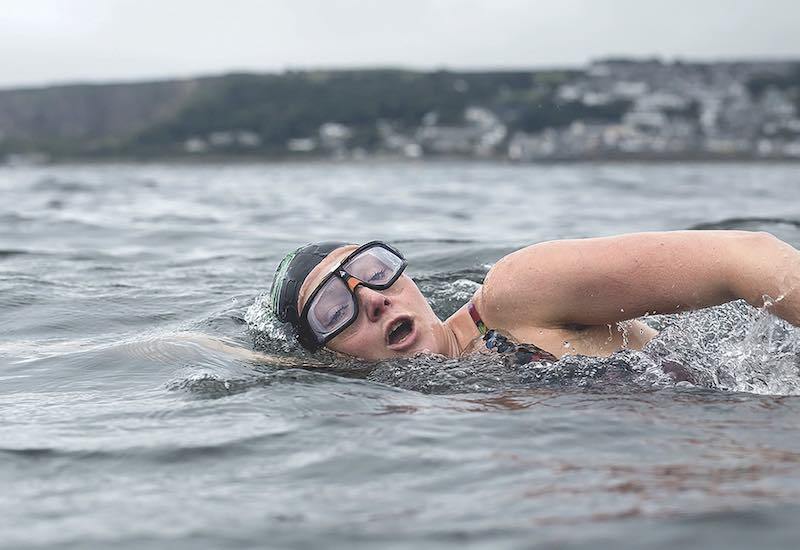
Is it hard to swim every day?
Sometimes it is harder to swim, especially in the winter when it is stormy, dark and cold outside but I never forget why I go. By swimming at dawn every day before I leave for work it is almost as though I am putting myself first, caring for me, topping up my own joy and energy levels and protecting my ability to better manage whatever the day throws at me in a more calm and positive manner.
What do you personally get from the sea?
It is regular time to myself, the stillness, the quiet and the close connection with nature that I love. There are always seals, starfish and sometimes we see dolphins – we have incredible views of St Michael’s Mount and the sun rising over the bay. The few other people that I swim with have become my daily swimming community – a tribe that I feel close to that is separate from my other roles and is something solely just for me. I feel like the sea supports me somehow, it accepts me in all of my moods and helps me to feel better about whatever I have going on in my life at the time. I have swum in estuaries, lakes and rivers but the sea has a fresher feel to it somehow.
How do you cope with the cold in the winter?
Due to swimming every day all year round the cold kind of creeps up on us gradually. We seem to be resilient to it now due to it being a slow process. I think if you weren’t a regular swimmer and you just jumped in mid-January it would feel a lot worse than it would to us. In February this year the sea temperature dropped to 1 degree with a minus 7 wind-chill – that was an experience! We wear gloves and socks in the winter to protect our extremities and if it gets really cold maybe two rash vests. The key to managing it is not staying in too long in the winter and getting dressed very quickly afterwards – making sure you always protect your core and put your top layers on first!
What are your favourite sea conditions?
I enjoy both summer and winter swimming – they just tend to offer different things. In the summer there is a peace about it all, the sea is flat, there is lots of colour and wildlife is in abundance! The dawns are breath-taking with incredible colours and the air and sea feel warm on your skin. The winter is just as enjoyable – there is something about cycling to the sea in icy wind and rain and jumping into angry rolling waves. There is no better way to feel fiercely alive.
How do you feel if you don’t manage to swim?
If I can’t swim I spend the whole day feeling lethargic and under the weather. I don’t have that usual happy buzz about me that swimming in the sea gives me. When I swim I feel happier, my day starts with purpose rather than feeling rushed and like I have had no real time to myself. When I have swum I deal with issues at work with ease and I rarely feel overwhelmed with emails or to do lists. When I don’t swim I feel groggy, moody and irritable, like I could easily give up on the day and just go home.
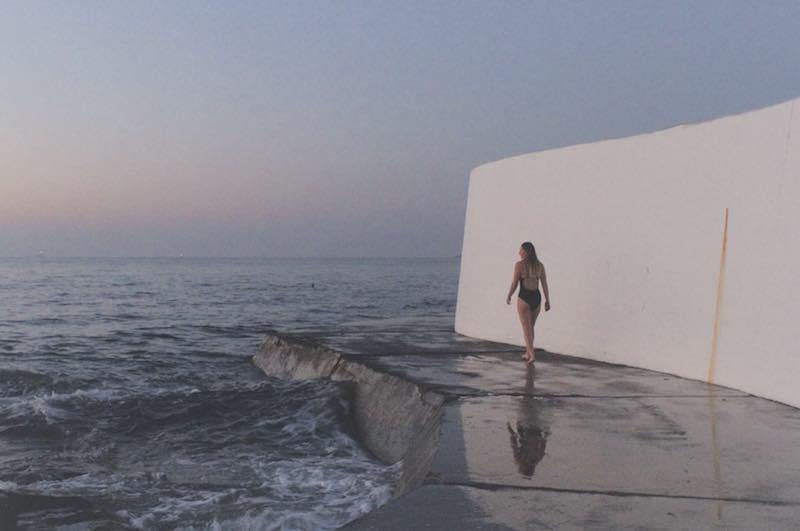
How important was the swim community to your recovery?
Feeling an integral part of a community group hugely supported my fight in returning to full health. I felt valued, supported and understood by the other swimmers, some in their eighties, who shared their own experiences of love, sadness and loss with me. Being part of a tribe of people who all enjoyed the same thing made me feel less alone and like I had a purpose again. I knew that they would always be waiting at the rocks for me. When you have lost all of yourself through a breakdown – being part of a community helps you to rebuild it.
What is your favourite season for sea swimming?
I really enjoy spring, everything feels like it is waking up and you get
incredible levels of energy in the sea. The spring tides bring with it deep blue rolling waves that feel like they are replenishing all of the life and colour once again in the sea. The wildlife starts to return, all of the seals, turnstones, starfish and oyster catchers. It is when everything starts to surface, the fury of winter starts to retreat and the sea becomes mellower in its mood.
Did you access traditional NHS services to try to cope with your burnout?
I visited my GP many times and was eventually put on anti-depressants – I feel that the medication helped to make me feel a small part of reality again but for me it was the swimming that enabled me to rebuild all of the parts of myself that I had sadly lost. The tablets rebalanced the chemicals in my brain but the swimming rebuilt my sense of self-worth, courage, pride, physical capability, belonging and purpose. Without the swimming I am unsure as to whether anything my GP could have done for me would have achieved the same.
What are your tips for those who struggle with the motivation to swim every day?
When telling my story I never want people to think that I spring out of bed every day at 6am desperate to get in the sea. Often and especially in the winter it is pitch black, freezing cold and raining with a sharp easterly wind blowing in from the sea. I have to force myself out of bed on these days but I know that if I go in I will feel amazing when I get out. The seals, the rainbows, the huge waves – there is always something worth going out for. I never return home and think I wish I hadn’t gone. I now get an overwhelming feeling of missing out if I don’t go.
Finding a purpose in the morning is essential if you struggle with motivation – there has to be a reward.Mine was the friendships, the fun we have, the adventures and the laughter – every day and every season our swims are different. If I wake up and hit the snooze button I am already starting my day with indecision and procrastination, often putting myself in a bad mood. Whereas if I start the day with somewhere to be and something fun to do then the benefits to my mental health are tenfold. I feel a real sense of achievement, of being an early morning explorer and that I have had some secret peaceful time that is just for and about me. Morning swimming and all that comes with it regularly reminds me that alongside all of the have tos, my time and my peace of mind genuinely matters.
How did the film Tonic of the Sea come about?
Shortly after my recovery I was





